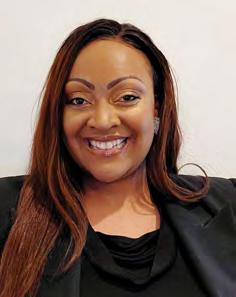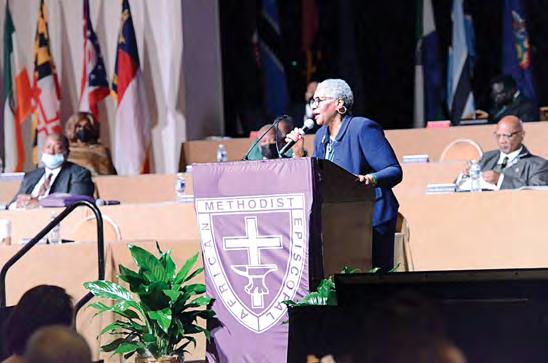
32 minute read
Report from the 2021 Annual Session of the General Board and Council of Bishops
TCR Staff Report
From December 6-8, 2021, African Methodist Episcopal Church clergy and Lay leaders gathered both virtually and physically in Nashville, Tennessee for the Annual Meeting of the General Board and the Council of Bishops. Under the leadership of Bishop Paul Kawimbe (president of the General Board) and Bishop E. Anne Henning Byfield (president of the Council of Bishops and host), the various departments, agencies, and Episcopal Districts of the AME Church gathered for the first organizational session of the General Board for the 2021-2024 period.
Advertisement
Bishop Paul Kawimbe called the opening plenary session to order shortly after 9:00 a.m. on December 6. The devotion was led by the Rev. Patrick Clayborn (2nd District) with a brief homily from the Rev. Dr. Michael Bell, Sr. entitled, “Joseph in the Pit,” from Genesis 37. Pastor Bell of Allen Chapel, Washington, DC reminded the assembled body that as the Connection moves toward 2024 we should be less concerned with positions and more concerned with mission. Following devotions, the Rev. Dr. Jeffery B. Cooper, general secretary/CIO, called the roll. Senior Bishop Adam Richardson offered greetings restating the message that “there is always a reason to praise God, [so, we] hallelujah anyhow.” Bishop E. Anne Henning Byfield, president of the Council of Bishops and host bishop, reminded the assembly that God decreed our presence in this moment, as necessary voices in the legacy of our connectional church.” Bishop James L. Davis of the 2nd Episcopal District acknowledged the various dignitaries with special mention of the general officers and Episcopal supervisors by name.
As the agenda was being considered, members of the General Board expressed their concerns about proper time being allocated to hear the report of the Department of Retirement Services. After vigorous debate, it was decided that the Board would expedite the organizing sessions of the various commissions to return to discuss the report of the Department of Retirement Services. The report of the Nominating Committee was considered with various Board members expressing concerns regarding gender parity as well as equality between clergy and laity on various commissions. Nominating Committee Chair Dr. J. Edgar Boyd (5th) presented the report and indicated that provisions were being made for later adjustments. The Board then recessed so that the commissions could meet. At the end of the morning session, Dr. Richard Allen Lewis, Sr., retired treasurer/CFO, presented the transition audit of previous six months closing out his tenure as a consultant. The report was received with acclaim and Mr. Marcus T. Henderson, Sr., treasurer/CFO presented a portrait in Dr. Lewis’ honor that will hang in the Joseph C. McKinney Office in Washington, D.C.
In the afternoon, the General Board reconvened at 3 p.m. with prayer led by retired Bishop Carolyn Tyler Guidry. The order of the day was the Department of Retirement Services. Bishop Byfield introduced AME Church General Counsel Douglass Selby who led a discussion about the current situation of the Department and its assets. An update was given by external consultants hired by the AME Church and the General Board was notified that a federal agency was conducting its own investigation into the Department of Retirement Services. After the report of the consultants and a brief question and answer period, the General Board adjourned for the day.
The Investiture Gala for Bishop E. Anne Henning Byfield was a showcase of arts and culture from around the 13th Episcopal District. The celebration began with the Tennessee State University Aristocrat of Bands Drumline ushering in Bishop Anne and Supervisor Ainsley Byfield. Among the highlights included a performance by acclaimed Grammy Award winning gospel artist CeCe Winans. Attendees were regaled with poetry and song from each of the annual conferences of the 13th Episcopal District. The Connectional Music and Christian Arts Ministry organized to sing a medley of hymns composed by Bishop Byfield. Historically Black Colleges and Universities (HBCUs) were highlighted and the keynote address for the evening was given by Dr. Glenda Glover, president of Tennessee State University, and the international president of Alpha Kappa Alpha Sorority, Incorporated. As the evening closed, Bishop Byfield thanked her family, the 13th Episcopal District, and the Connectional Church for their support. Additionally, Bishop Byfield announced that $17,000 was donated to the rebuilding of St. John AME Church in Nashville which was destroyed by the 2020 Nashville tornado.
The General Board reconvened at 9 a.m. with morning devotionals led by Bishop James Davis. Following praise and worship, we were led in prayer by the Rev. Thomas O. Nixon before the exhortation of the Rev. Tony Lee (2nd Episcopal District). Speaking from Joshua 3, he reminded us that in the death-dealing world of pandemic, politics, and protests we have been encouraged by knowing that we serve a God who will move the waters of the river out of our way. The business session began shortly after 9:30 a.m. with a motion by Dr. Cooper to hold all reports for electronic submission to the body by the end of the week. It was properly seconded and passed.
Bro. Carl Davis (10th Episcopal District), secretary of the Nominations Committee, presented the amendments to the nominations. Concerns were again raised regarding the composition of the commissions specifically for laity on the Commission on Statistics and Finance Committee and gender equity on the broader General Board commissions. It was moved and properly seconded that the body approve the report as it was read with recommendations that those considerations be made in the next General Board Meeting. In addition, a new standard of operation to include those demographics moving forward. A delegation led by the Rev. Matthew Watley (2nd Episcopal District) presented a resolution to address the situation of the Department of Retirement Services. After a period of lively debate, the body voted to amend the resolution with consideration for the discipline of the church, legal ramifications, and funds available. The General Board voted to reconvene on January 30 to complete the work outlined in the resolution.
After the debate, updates were received from disaster relief efforts in the 16th and 8th Episcopal districts. Bishop Zanders reported that 3600 persons were assisted by relief efforts from the 16th Episcopal District and AME-SADA. Bishop Wicker reported that $52,000 had been received by the 8th Episcopal District for their recent hurricane relief. At the seat of the General Board, Bishop Julius McAllister of the 1st Episcopal District gave an additional $10,000. The General Board adjourned at 12:10 p.m. with a benediction from Senior Bishop Richardson.
COMMISSION RECOMMENDATIONS
Commission on Social Action, Bishop E. Anne Henning Byfield, Chair 1. Mrs. Jacquelyn Dupont-Walker elected director/consultant and Mrs. Ora Easley elected administrator of the Clergy Family Information Center. 2. The Commission will convene during the week of December 19, 2021. 3. We will identify key issues of those raised at the 51st Session of the General
Conference to immediately activate the network of Episcopal District coordinators. Commission on Retirement Services, Bishop John F. White, Chair No recommendations. Commission on Economic Development, Bishop Harry L. Seawright, Chair 1. Host an Economic Development Summit in 2023—Place to be announced. 2. That the Legacy Card be considered as a possible venture for the Connectional Church.
Commission on Christian Education, Bishop Frank Madison Reid III, Chair No recommendations. Commission on Global Development, Bishop Silvester Beaman, Chair No recommendations.
Commission on Church Growth and Development, Bishop Reginald T. Jackson, Chair No recommendations. Commission on Global Witness and Ministry, Bishop Michael Mitchell, Chair No recommendations.
Commission on Chaplains, Bishop Jeffrey N. Leath, Chair No recommendations. Commission on Health, Bishop Francine A. Brookins, Chair No recommendations.
...continued on p24
Commission on the Lay Organization 1. Embrace the 10 Point Plan of the
Connectional president: 1) Execute the vision of the Lay Organization through teaching and training; 2)
Advance issues of social justice and development plans; 3) Ensure the
Lay Organization is biblically based and anchored in prayer; 4) Enhance global inclusion and participation of all Episcopal districts; 5) Create open communication by embracing technology; 6) Enhance stakeholder engagement; 7) Grow membership and enhance agility and sustainability; 8) Maintain healthy financial management; 9) Streamline processes; 10) Nurture history, heritage, and traditions
Commission on Ministry and Recruitment, Bishop Ronnie Brailsford, Chair
No recommendations.
Commission on Publications, Bishop David R. Daniels, Chair. 1. Election of the Rev. Lisa C.
Hammonds as assistant editor of
The Christian Recorder.
Commission on Seminaries, Universities, Colleges, and Schools
No recommendations.
Commission on Statistics and Finance, Bishop Samuel L. Green, Sr., Chair 1. That districts 3, 7, 8, 11, and 12 be allowed to raise funds for special projects.
Commission on Women in Ministry, Bishop Frederick A. Wright, Chair
No recommendations.
GENERAL BOARD SESSIONS: DAY 1
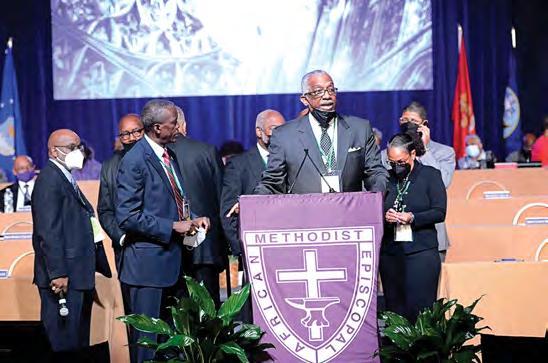

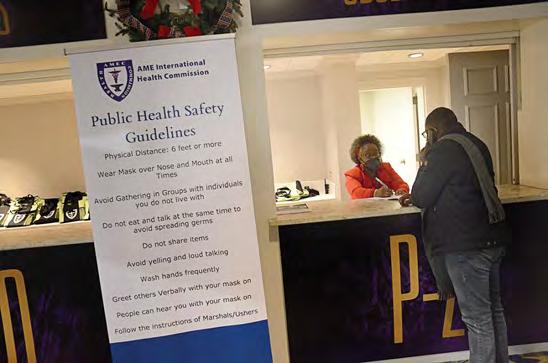
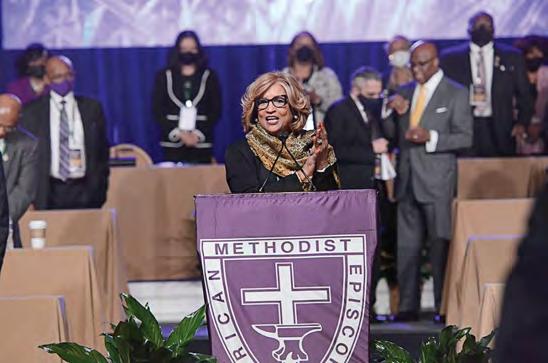



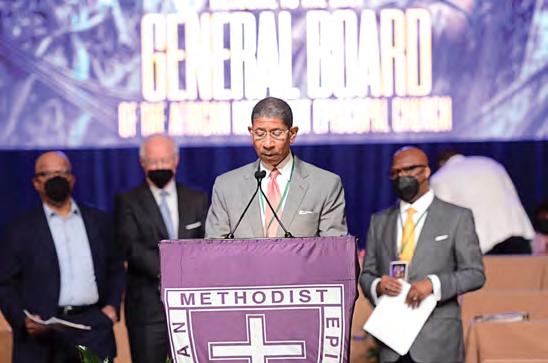

GENERAL BOARD SESSIONS: DAY 2 AND INVESTITURE
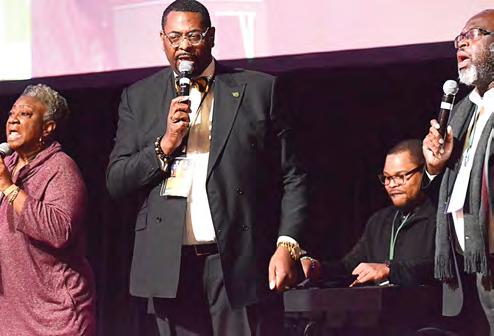
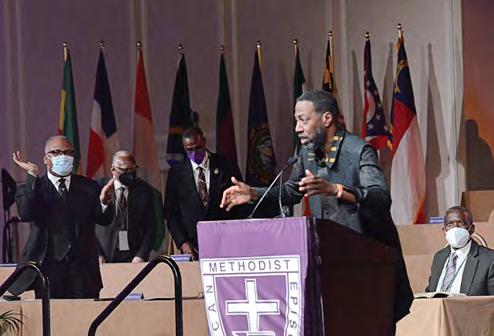

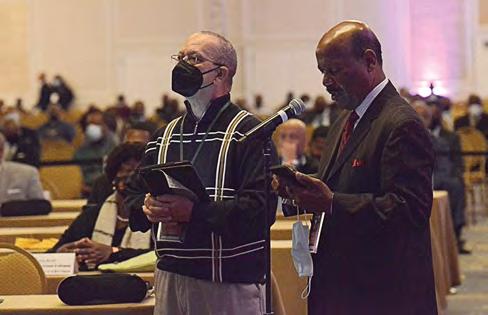

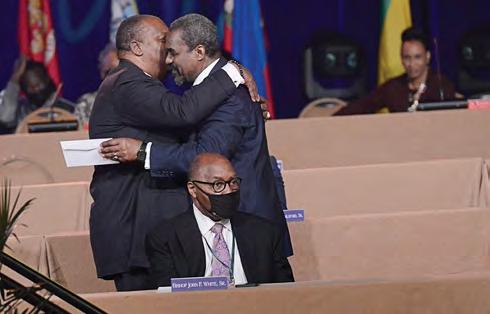
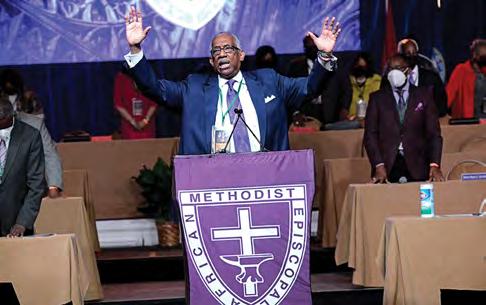







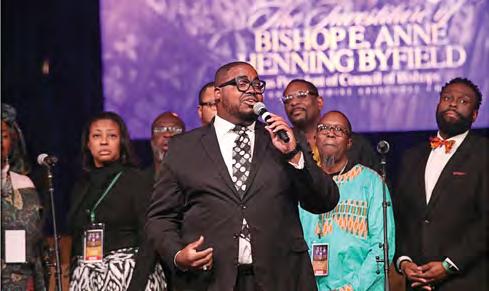

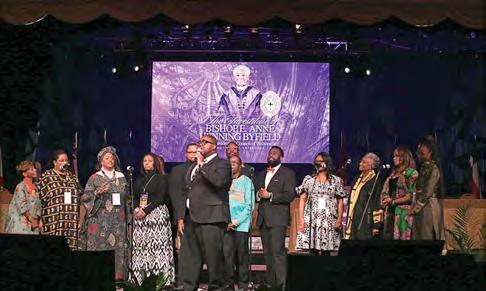

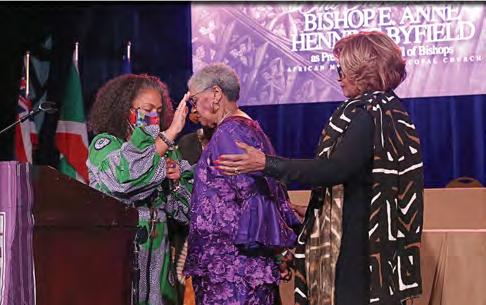









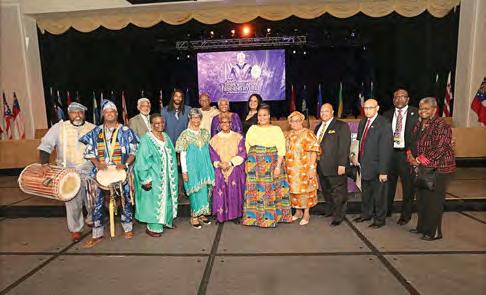
ARE WE MOVING IN A FAITHFUL DIRECTION?
By Reverend James A. Keaton, Jr., 7th Episcopal District.
Undoubtedly, one of the most interesting occurrences of the 51st quadrennial session of the General Conference of the AME Church was the passing of a resolution to establish a committee to discern sexual ethics related to LGBTQ+ matters. This resolution passed only one day after the General Conference voted down a bill that, among other things, would have permitted ordained clergy to perform marriages for people of the same gender. Religious news outlets and social media were filled with the news that the oldest black denomination in the country passed a resolution regarding discerning human sexuality. For the past four months, I have been reflecting on this resolution. Three components are increasingly concerning.
The first concern is that the committee will “identify, study, and explain” all biblical texts and “relevant” AME doctrine and traditions of biblical interpretation relating to sexual orientation and gender identities. When we examine passages in both the Old Testament and New Testament, there is no biblical support for samegender marriages, different sexual orientations, or different gender identities. From the teachings of the Torah to the writings of the Old Testament to the passages in the New Testament, there is a coherent message that anything outside of heterosexual relationships is not supported by scripture.
As a pastor in the AME Church, I cannot understand why a committee needs to be established to study and explain biblical texts that are clear and consistent in their message. Black people are better able than most to understand what happens when scripture is manipulated and misinterpreted to say what people want them to say. The misinterpretation of scripture enabled chattel slavery, the oppressive laws of Jim Crow, and continues to contribute to a highly racialized society.
The second concern is related to the intention of the testimonials of LGBTQ+ brothers and sisters of African descent that will allow them to share their perspectives on the “position of the church.” The concern here is not the testimonials but the purpose behind them. While I agree that open communication can strengthen relationships between brothers and sisters in Christ, the wording of the resolution suggests that the goal of the testimonials is to change the church’s position on human sexuality. The position of the AME Church on this matter is consistent with the teachings of scripture.
As a result, it is concerning that this committee will try to use the discomfort of LGBTQ+ brothers and sisters to move the church away from a biblically-based doctrine. The Christian church is only faithful when it is committed to the word of God. We must remember that all of us are sinners, and therefore, some aspects of the gospel will make ALL of us uncomfortable. Regardless of the sins that cause us to struggle, we all need God’s mercy and grace. God’s word is designed to transform us to become the people that God calls us to be. Consequently, church doctrine must be based on the teachings of scripture and not the things that make us comfortable.
The third concern is regarding the church relegating human sexuality as a social justice issue. As African Methodists, we readily embrace our heritage as a “liberating and reconciling” church. However, do we have the right as the church of God to advocate for issues in the name of social justice contrary to the teachings of scripture? In other words, as a church that celebrates a legacy of reconciliation and liberation, how formative is scripture in our advocacy for social justice? As the body of Jesus Christ, the church does not have the luxury or liberty to embrace or encourage anything contrary to the word of God. It is scripture that gives us our foundation to pursue social justice.
As we move forward, the question must be asked, how much authority does scripture have in the 21st century African Methodist Episcopal Church? Is it the foundation on which we stand, or is it simply suggestive literature that we have the liberty to pick up and put down when it is convenient? If we are going to reach our full God-given potential, the word of God is the only way that we can move forward.

d d Th Ch
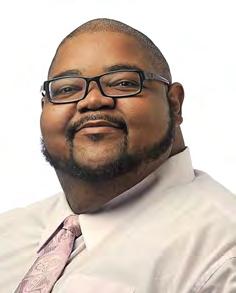
JESUS, PAUL, KING, AND THE (NON) SELF
By George Pratt, Contributing Writer
Both Jesus and Paul preached the idea of a “kingdom on earth” for believers (those in Christ consciousnesses) and annihilation for nonbelievers. New Testament scholar Dr. Bart Ehrman, in Heaven and Hell: A History of the Afterlife, explains that the modern concept of hell and heaven was not constructed until centuries after Jesus. In Forged, Ehrman describes how Paul believed Christ was coming back during Paul’s lifetime.
So, I questioned: what does Paul mean when he writes, “To be absent from the body is to be present with the Lord” (2 Corinthians 5:8 KJV)? I was then led to see what else Paul had to say about the body or the physical self. Paul informs the Galatians that “those who are Christ’s have crucified the flesh with its passions and desires” (v. 24). Naturally, I was drawn to consider the crucifixion narrative to discern my interpretation of Paul.
In the sacred epic, Jesus demonstrates that the absolute denial of the body (or the self) equals transcendence or oneness with God or the Ultimate. Also, this understanding further contextualizes Jesus’ view of himself as being one with God, the “Father,” and yet not the Father (John 17:21). I believe this same sense of non-dualism is present in King’s last speech, “I’ve Been to the Mountaintop,” when he says, “It really doesn’t matter what happens to me now…like anybody, I would like to live a long life, longevity has its place, but I just want to do God’s will….”
Here, King associates the “me” with the physical body using longevity to measure the human self, noting the innate human desire for long life or something more. Our bodies serve as vessels through which we have experiences here on earth. In most cases, we intend to live as long as possible to get as much out of life as we can. King nullifies this natural concern with the lived body with a desire to do God’s will or, what I interpret, to become God’s will, to become one with God, a denial of the self. I am in no way insinuating that to unify with the Ultimate requires physical death, but rather I am reminded of the “secret sayings” of the “living Jesus” in the gospel of Thomas when he advises that “whoever finds the interpretation” of said teachings “will not experience death.” In one of these secret lessons, Jesus teaches, “When you come to know yourselves… you will realize that it is you who are the sons of the living father. But if you will not know yourselves, you dwell in poverty….” Jesus identifies the self as an entity descended from the Ultimate, “the son(s) of God,” to which he called himself and what his followers were called. In The Five Gospels (1996), Robert W. Funk, et al. elaborate that the self Jesus references here is the Christ-self. He considers the true self, the self we should all know to overcome death, the illusion thereof, and poverty-life outside true knowledge. I would argue that the self-denial that both Jesus and King portray reflects the existence of a non-self, pointing to the Buddhist doctrine of anatman (non-self). On a basic level, this principle posits that when we deny ourselves, we experience part of a wider network of others whose interests, desires, pleasures, and pains we share. This detached concern for others and not for self serves as the core of Jesus’ and King’s morality and agency. In this regard, the Church Universal and all of humanity are called to strive for Nirvana or enlightenment by ridding of the cause of suffering, the individual self. ❏ ❏ ❏


BISHOP WILLIAM PHILLIPS DEVEAUX, SR. (1941-2021) DEVEAUX, SR. (1941
The Right Reverend William P. DeVeaux was born to Chaplain John and Della DeVeaux in Fort Huachuca, Arizona. The youngest of three children, he spent his elementary and high school years living on army posts in Maryland, Kansas, Colorado, and in Germany. Upon graduation from high school, he entered Howard University. An active student, he was elected junior and senior class president and Basileus of Omega Psi Phi Fraternity. While a student at Howard, he answered the call to the ordained ministry. Following in his father’s footsteps, he served in the United States Army as a chaplain. In the midst of enemy fire, he brought comfort and solace to troops in combat during the Vietnam Conflict. In addition to a bachelor’s degree from Howard University, he attained a Bachelor of Sacred Theology from Boston University as well as a Master of Arts and Doctor of Philosophy from Vanderbilt University. He

SAMANTHA MARCELLA TOOLE KENDALL (1929-2021) KENDALL (1929-202
Jesus, God incarnate, truly is the author and finisher of our faith. He is the One who proclaims the beginning and end of every good and perfect gift. And every good and perfect union. He made that clear on November 17, 1941, when he ordained the marriage of Samantha Marcellus Toole to Finley Jesse Kendall. And it was Jesus who called Samantha Toole Kendall from labor to reward on November 17, 2021, so that she could reunite in heaven with Finley, the love of her life, on the exact date of their 80th wedding anniversary.
Jesus authored the beginning of Samantha’s life and her perfect union with Finley. And he sealed the deal by finishing it all with a perfect ending for a woman of God who walked and talked, who lived and breathed, who taught and modeled love. No one can describe her journey here on earth better than Mother Kendall. So, following are some of the words she wrote about who she is—and why—from a short autobiography she drafted in 1976.
I, Samantha Toole Kendall, was born to Dixie Williams and Ira Toole in the small town of Oneida, Arkansas, on January 11, 1923. I was the fifth of eight children, seven girls and one boy. My parents were farmers, but they also did odd jobs to supplement their farm income. After graduating from elementary school, I attended high school 115 miles away from home in Pine Bluff, Arkansas. I lived in a home for girls that was located on the campus of Arkansas AM&N College. After completing high school, I received the equivalent of an Associate’s Degree from Forest Park Community College, with emphasis on Communications. I spent many hours receiving educational training that was job related. I accepted Jesus Christ as my savior in 1932 at First Baptist Church of Elaine, Arkansas.
I married Finley Kendall, whom I have been married to for 35 years as of this past November 17, 1976. We are the parents of four children, two boys and two girls.
The children were born in St. Louis, where we moved
— TRANSITIONS —
has served on the faculties of Meharry Medical College, Princeton Theological Seminary, and Howard University School of Divinity. In the field of theological education, Bishop DeVeaux is recognized for his achievements as the executive director of the Fund for Theological Education Inc. During his tenure, scholarships to black, Hispanic, and Native American students were granted to support their theological education.
His career as a minister in the African Methodist Episcopal Church includes pastorates at Bethel AME Church in Lynn, MA; St. John AME Church in Nashville, TN; Wayman AME Church in Dayton, OH, and Metropolitan AME Church in Washington, D.C. He served at Metropolitan from 1986 until his election to the office of bishop. Using his personal leadership style, academic expertise, and his diverse ministerial experience, Bishop DeVeaux energized the church membership into active participants in community outreach efforts. On July 2, 1996, the Reverend Dr. William P. DeVeaux was consecrated as the 113th bishop of the African Methodist Episcopal Church in Louisville, Kentucky, and was assigned to Southern Africa where he lived and served for four years. He also served as the presiding bishop of the 16th Episcopal District of the AME Church which
in 1948. At the writing of this autobiography, the children have graduated from college. The youngest son (Steven) received his Master’s in Business. The youngest daughter (Jessica) received her Master’s in Counseling. The oldest son (Charles) has a degree in Music and is an instrumental instructor for the St. Louis Public School System. The oldest daughter (Jean) is a physical therapist at the St. Louis Comprehensive Health Center. All of the children are gainfully employed and are on their own.
During the early years of my married life I did many odd jobs, which contributed very little to the income. My husband disapproved of my working, but did not insist that I stop. Due to having children I only could work for short periods of time. My husband and I opened a restaurant on Jefferson Avenue and operated it for 11 years. We did not make any money, but we learned how not to run a business. HIGHLIGHTS IN HER OWN WORDS:
Family: Mother of four successful children.
Church Affiliation: A member of Wayman AME Church since 1949. Former Sunday School teacher. Presently Sunday School and Bible scholar. Founder and member of Wayman’s Scholarship Council. Past president and active member of the Local and Conference Lay Organizations and the choir. Dedicated involvement with the Lay Organization. Served as the Missouri Conference Lay president for 8 years, director of Lay Activities for the Missouri Conference, and was the chaplain for the Fifth District Lay Organziation.
EMPLOYMENT: Have worked in Community Programs (Human Development Corporation, Yeatman District Corps, and Women in Community Service/Job Corps) for 23 years. I work with young people ages 1625, recruiting them for Job Corps programs in St. Louis, outstate Missouri, Utah, and Kentucky. MY STRONG POINTS:
Analytical Skills: Able to check situations out, using available information plus additional data that may be obtained from a variety of sources.
Leadership Ability: Experience gained from work, serving as a supervisor and department head at Yeatman Training Corps.
Church: Sunday School teacher. Youth instructor for includes the following conferences: Guyana/Suriname, Windward Islands, Virgin Islands, Dominican Republic, Haiti, Jamaica, and London/Holland. He also served as the presiding bishop, with distinction and grace, to the Sixth Episcopal District (the state of Georgia) as well as the Second Episcopal District (Maryland, Washington D.C., Virginia, and North Carolina). Bishop DeVeaux and the late Dr. PAM DeVeaux parented six children, a host of sons and daughters in the gospel, and they have fifteen grandchildren. Bishop DeVeaux remained steadfast in his belief that he can best serve Jesus by, ‘’Ordering his steps in the Lord” and followed the Lord peacefully on the morning of December 31, 2021, with his family at his side.
Bishop DeVeaux was married for nearly 59 years to Dr. Patricia Ann Morris DeVeaux (PAM) born in Wilmington, Delaware to the late Jesse and Amanda Morris. Bishop and Dr. PAM were blessed by the presence of six children (Dawn, Dana, William, Paul, Robin, and David), and fifteen grandchildren (Ryanne Patricia, William Samir, William III, Alexis, Daleah, Maya, Jordan, Clayton William, Maxine, Jalen, Cameron DeVeaux, Keith David, Connor, Malachi, and Joshua) in their lives, as well as a host of spiritual sons and daughters. ❏ ❏ ❏
Special Events. Founder of the very successful Scholarship Committee, the Bessie M. Pointer Memorial Council of Wayman, presently giving financial assistance to 33 college students.
Motivational Ability: As a result of my interest and my enthusiasm, maturation takes place with many that I come in contact with.
Interpersonal/Communication Skills: I work well with people, regardless of age, gender, and/or color. Experienced in working with young people and summer youth workers. Organized Youth Councils and trained them in leadership responsibilities.
Open-Mindedness: I learn from many sources. Preparedness: Advocate of education and continuing education.
Over the years, Mother Kendall’s inclination to nurture everyone she encountered continually affirmed the depth of character, faith, and service she wrote about in the brief autobiography she drafted in 1976. Throughout her life, her energy was focused on the betterment of humankind and love of family—biological and spiritual. She believed her efforts were successful because of her strong Christian beliefs, which were rooted in her awareness that only what you do for Christ will last.
Mother Kendall will always be remembered for her broad smile, quick wit, inventive mindset, and visionary leadership, all of which came to an end—quietly, peacefully, shockingly— just shy of a century’s worth of living and giving. Everything she contributed to uplift and enlighten God’s people was great. But, to Mother Kendall, her greatest gift was to give Bro. Finley and the world four children who exemplified the Christlikeness she radiated throughout her life.
Mother Kendall departed this life on November 17, 2021. She was preceded in death by her beloved husband, Finley; sons Charles and Steven Kendall; nephew Trent Kendall; six sisters, and one brother. Left to cherish her memory are daughters Jean Barnes Kendall and Jessica Kendall Ingram (Gregory); grandchildren Kendrick Kendall (Leslie), Relton Barnes (Michale) and Jennifer McCoy (Gregory); great granddaughters Amber, Madison and Raigan Barnes, Anjanee’ Kendall, Gabrielle McCoy and Jayda Sanford; great great grandson Riley Bailey; nephew Douglas Johnson; caregivers Angela Kendall and Arnita West; members of Wayman; and a host of relatives and friends. ❏ ❏ ❏
EDITORIAL
DECOLONIZING THE AME CHURCH
By John Thomas III, Editor
On November 30 at midnight, the Caribbean country of Barbados celebrated the transition from a constitutional monarchy to a parliamentary republic. As a result, the island’s head of state would no longer be Queen Elizabeth II but a president elected by Parliament. Barbados has been independent and self-governing since 1966, yet the British monarch retained its governance by appointing a local governor-general serving as the Queen’s representative. After decades of debate, the island finally broke its final colonial tie and recognized its first homegrown head of state.
As I watched the ceremony live with my mother, uncle, and family on the island, I noticed the pride and pomp of the occasion as the country claimed its full sovereignty. No longer would official oaths of loyalty be sworn to the British Crown but now to the Republic of Barbados. As I listened to President Sandra Mason and Prime Minister Mia Motley give their speeches, I heard the emotion and pride of no longer having to represent the Queen nominally. Prince Charles was on hand to celebrate the new chapter of Barbados—a member of the Commonwealth but a country over which he would never reign.
After the ceremony, I reflected on the status of the African Methodist Episcopal Church outside the United States. Since 1822, the AME Church has been an international church. As we expanded our geographic outreach, we have had to face the cultural and political realities of how African Methodism translates locally. For example, in 1856, many of the AME churches in Canada separated to form the British Methodist Episcopal (BME) Church to avoid enforcement of the Fugitive Slave Act and advocate for local jurisdiction. Even after the Civil War ended, a majority of BME churches in Canada decided against rejoining the AME Church. In South Africa, apartheid-era concerns regarding the conduct of “foreign” blacks necessitated the election of Bishop Francis Gow in 1956 and the reconfiguration of the African work, as colonialism ended in the 1970s, to avoid engaging with the South African apartheid regime.
The creation of an international Methodist denomination led by black bishops was a revolutionary act in the 19th century. Decades before black bishops would be consecrated in The United Methodist Church or in any African church, AME bishops were fully recognized and embraced at the highest levels of the ecumenical and ecclesiastical world. This symbol was one of the reasons that led Father M.M. Mokone to affiliate his Ethiopian Orthodox Church in South Africa with the AME Church in the United States. It is also why the AME Church became a beacon of hope to anti-colonial fighters across the Caribbean and Africa.
While once a defiant act in the age of empire and colonialism, sending black American bishops to superintend areas outside of the United States is a colonial relic parallel to the Queen of England positioned as Barbados’ head of state. In the religious establishments of newly independent countries, European leaders were replaced with indigenous clerics. While the Catholic, Episcopal, and other Methodist churches transformed their highest ranks, the AME Church lagged content to have the supreme governance vested in an American named at the General Conference. The clamors for “indigenous leadership” through the Africa Jurisdiction Council (AJC) led the AME Church to elect three African bishops in 2004. While again important symbols, none of these Africanborn bishops served more than eight years in their “indigenous” area, and concerns regarding governance and sovereignty from districts 14-20 have increasingly grown louder.The election of a Connectional Lay president and a member of the Judicial Council from South Africa in 2021 are equally great symbols but do not get at the deeper problems of estrangement that pervade the clergy and members of the AME Church outside the United States.
Having a native head of state for Barbados is symbolic, but symbols are important. Denominations as diverse as the Assemblies of God, the Catholic Church, and the Episcopal Church have known that substantive authority must be vested in leadership rooted and grown in the country to truly grow and participate in a national landscape. Relying on American and foreign-born bishops to lead districts 14-20 not only stunts our growth but stifles our prophetic voice and makes us look like the European imperialists that have long since left their colonies behind. Furthermore, maintaining these areas as excuses to elect American placeholders to bide their time until a U.S. slot becomes available is no longer tenable or practical. The African Methodist empire must end.
In the same way that Barbados reimagined its relationship with the United Kingdom, districts 1-13 must reimagine their relationship with districts 14-20. The Global Development Council (formally known as the AJC) blueprint of instituting authentic indigenous leadership outside of the United States must be implemented. While some districts may need stronger ties to the United States, several areas are past due for complete autonomy and locally elected Episcopal leadership. We must have intelligent discussions about how the Connectional Church truly works and what is best for living the dream of the Free African Society.
Within the last 25 years, no less than five separate denominations have split from the AME Church on the continent of Africa, and the AME Church is fast becoming out of touch with members in the Caribbean. If a viable plan to provide for sovereignty is not created, Americans will wake up at a General Conference to realize that all that is left of districts 14-20 are flags and memories. ❏ ❏ ❏


John Thomas III 21st Editor of The Christian Recorder

JUST FOR A MOMENT SO SHINE!
By Licentiate Tricia I. Thomas, Contributing Writer
As we all know, we are a few short weeks away from the greatest birthday in all of history, the birth of our Lord and Savior, Jesus the Christ. In the African Methodist Episcopal Church, our tradition is to partake in Advent. In the Christian church calendar, Advent (from Latin adventus, “coming”) is the period of preparation for the celebration of the birth of Jesus Christ at Christmas and preparation for the Second Coming of Christ. So, as we prepare to celebrate the birth of Christ, I just wanted to take a few moments to shed some light on the light of the world.
During this Christmas season, families all around the world put up Christmas trees—some real, some fake, and some attempting to emulate the 75 plus foot Christmas tree in Rockefeller Center, New York, while still others use small desktop “Charlie Brown” versions to bring in the Christmas cheer. The vast majority of trees have in common that they are decorated and adorned in lights. A great songwriter, Stevie Wonder, once said, “One little Christmas tree can light up the world, so those who are lost may find their way. One little Christmas tree can light up the world so that all men may see you on Christmas Day.”
From a religious or theological viewpoint, we can assert that we ourselves are the Christmas trees. We can cause a domino effect lighting the world by displaying our lights. Subsequently, as we light up the world, all women and men will see the light, Christ, within us. Likewise, in the gospel, according to Matthew, we, as Christians, are to be representatives of the light in this world. Specifically, in Matthew 5:14-16, Jesus teaches that we “are the light of the world. A city built on a hill cannot be hid.” When we turn on our lights, we cannot be hidden; our lights can and will shine and transcend into places unimaginable. I challenge you, not just during the Advent season but throughout your Christian journey, to light up the world.
Quite literally, we as children of God can then be considered children of the light, spreading the news near and far about the birth, life, and resurrection of Christ, but we must be willing to flip the switch. How do you flip the switch? By connecting to the ultimate power source, God! In Virginia, Dominion Energy is the main power source, providing electricity to houses throughout the state. In the church, God is the main power source, and as long as our little lights are connected to him, can’t no devil dim your light! Through God and through Christ, we are given a divine connection that brings light and happiness even until the end of time. God’s power and light dwell within each born-again believer, and they energize each believer’s life and ministry.
Acts 1:8 reads, “But you will receive power when the Holy Spirit has come upon you; and you will be my witnesses in Jerusalem, in all Judea and Samaria, and to the ends of the earth.” The power of God, the light of God, is received by allowing the Holy Spirit to move within and through you. And by doing such, the Spirit shines through as light does, making you a witness to the whole world of the power of God.
I come against any thought that anyone may have that their light is too small or ineffective. Christ is calling us to be the light in the darkness. Never forget that your light is a beacon on a hill. “You are the light of the world. A city built on a hill cannot be hid. No one after lighting a lamp puts it under the bushel basket, but on the lampstand, and it gives light to all in the house. In the same way, let your light shine before others, so that they may see your good works and give glory to your Father in heaven” (Matthew 5:14-16). So, shine, my brothers and sisters! Shine! ❏ ❏ ❏

